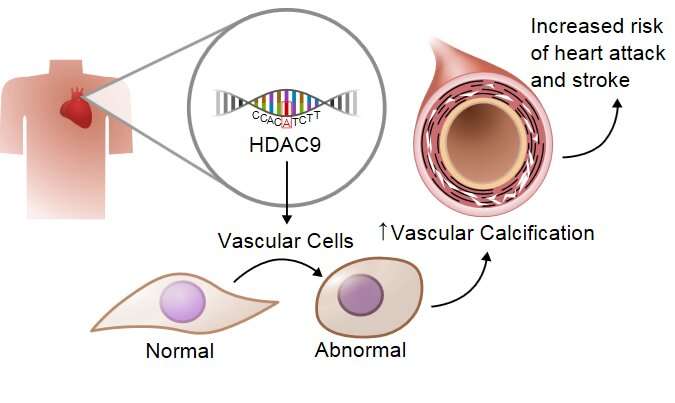Source: Thailand Medical News Nov 30, 2019 6 years, 2 months, 1 day, 20 hours, 16 minutes ago
Researchers from Massachusetts General Hospital have identified a specific gene, the
HDAC9 gene in the calcification of the human aorta, the largest blood vessel in the body.
Typically,
Cardiovascular Arterial wall calcification is the buildup of calcium in the blood vessel walls, which can often be a predictor of serious cardiovascular events like heart attacks and strokes. Scientists have long pointed to family history as one possible cause for this hardening of the arteries.
 Genetics of blood vessel hardening. Credit: Mr. Haakon Sigurslid and Dr. Rajeev Malhotra
Genetics of blood vessel hardening. Credit: Mr. Haakon Sigurslid and Dr. Rajeev Malhotra
The new study was published in
Nature Genetics journal.
The research study looked at more than 11,000 people and found patients with significant blood vessel calcification were more likely to have a specific variant of
HDAC9. This high-risk variant of
HDAC9 is present in about 25 percent of the population. In follow-up mouse studies, the researchers also found
HDAC9 caused abnormal changes in the cells of the vessel walls, resembling that of human bone cells.
Dr Rajeev Malhotra, MD, of the Massachusetts General Hospital Cardiovascular Research Center and the study's co-lead author told
Thailand Medical News, "Our research proved
HDAC9 is not just associated with cardiovascular disease but can actually cause it by changing the makeup of those vascular cells. We then investigated it at the molecular level and looked at what would happen if we knocked out
HDAC9."
The
genetic researchers found that inhibiting
HDAC9 in mice preserved normal function in vascular cells and prevented vascular calcification, therefore identifying
HDAC9 as a target for the potential treatment of cardiovascular disease. "Currently, there are no heart drugs available to patients that would prevent this type of hardening of the arteries," said Christopher J. O'Donnell, MD, MPH, of the Cardiology Divisions of Boston Veterans Administration Healthcare System and Brigham and Women's Hospital, and also a co-lead author of the study. "These findings are exciting in that they harness genetics to open the door for future pathways to
heart disease prevention."
Reference: Rajeev Malhotra et al, HDAC9 is implicated in atherosclerotic aortic calcification and affects vascular smooth muscle cell phenotype, Nature Genetics (2019). DOI: 10.1038/s41588-019-0514-8
